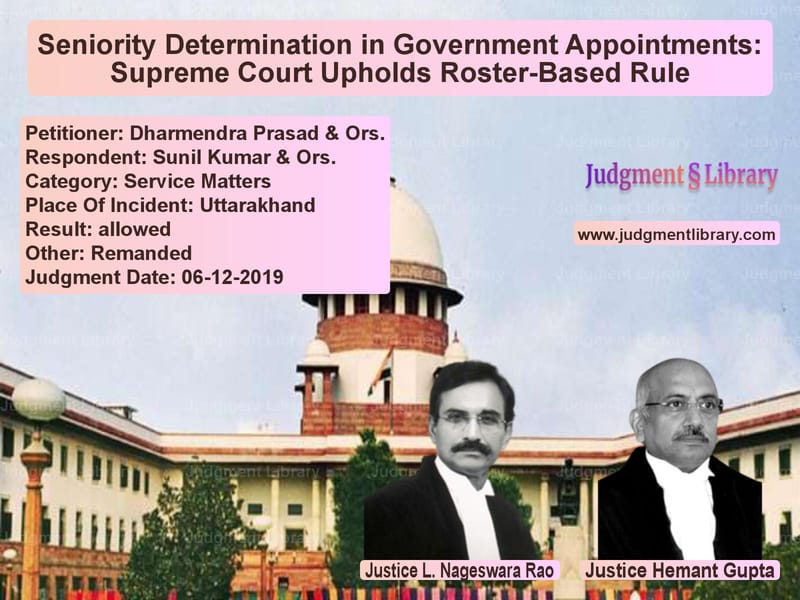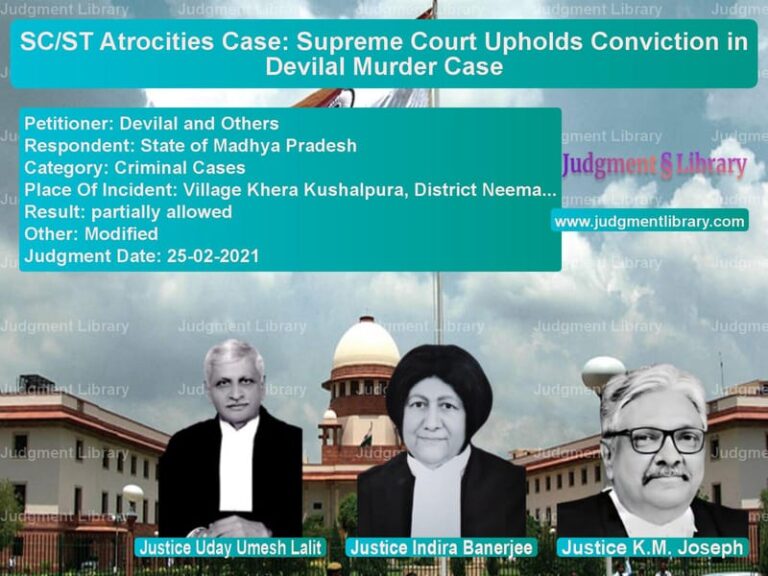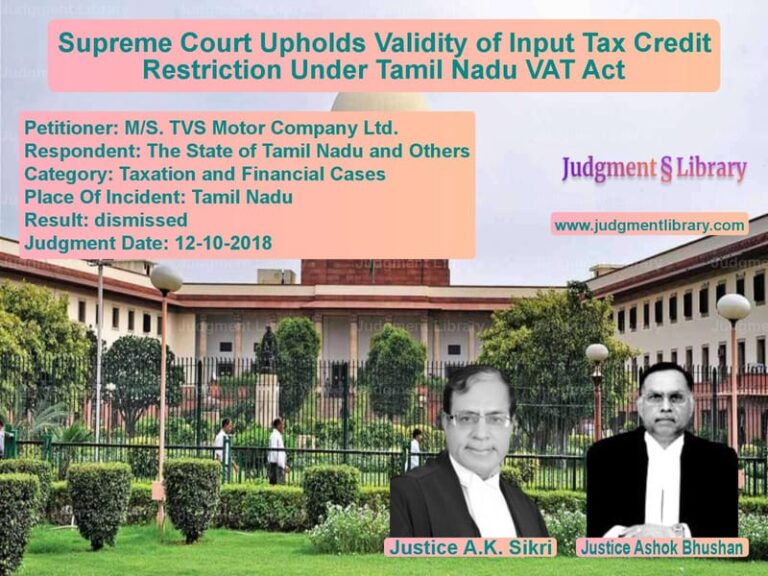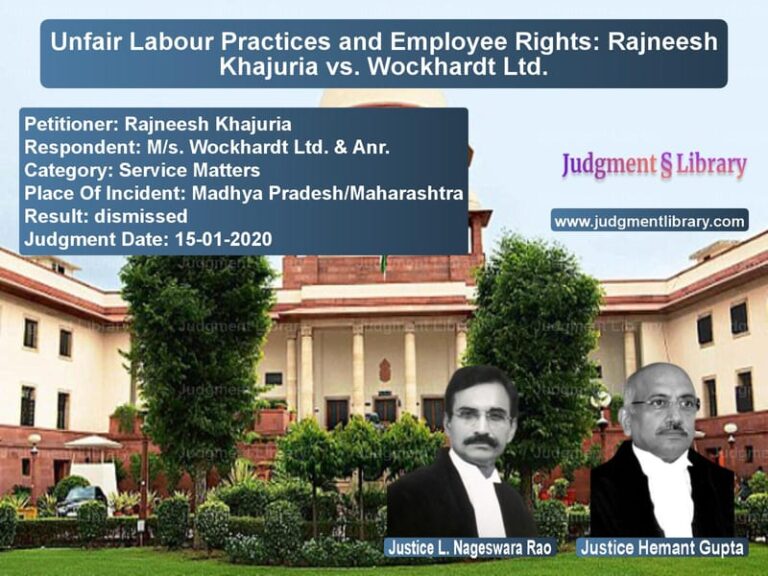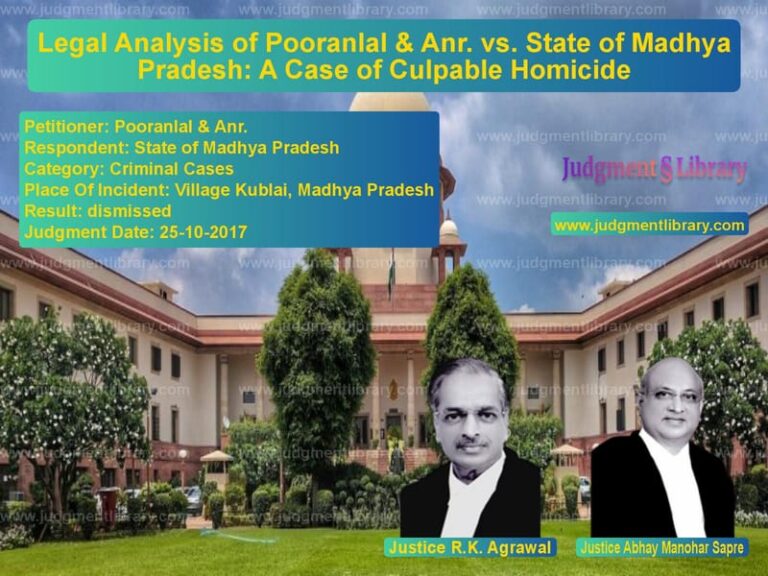Seniority Determination in Government Appointments: Supreme Court Upholds Roster-Based Rule
The case of Dharmendra Prasad & Ors. v. Sunil Kumar & Ors. is a landmark ruling concerning the determination of seniority in government appointments. The Supreme Court, in its judgment dated December 6, 2019, ruled that seniority must be determined as per the roster-based reservation system and not solely based on the date of appointment. The ruling provides clarity on the interplay between merit-based selection and roster-based seniority in public employment.
Background of the Case
The appellants, Dharmendra Prasad and others, were candidates selected for the post of Junior Engineer (Civil) in Uttarakhand Pey Jal Nigam, a statutory body created under the Uttar Pradesh Water Works and Sewer Arrangement Act, 1975. The dispute arose over the seniority list prepared by the department, which ranked candidates based on the date of appointment rather than their merit in the selection process.
The Uttarakhand Public Service Tribunal dismissed the appellants’ claims, and the High Court of Uttarakhand at Nainital upheld the ruling, stating that seniority should be determined as per Regulation 23 of the Uttar Pradesh Jal Nigam Subordinate Engineering Service Regulations, 1978. The appellants then approached the Supreme Court.
Petitioner’s Arguments
The appellants argued that:
- The appointments were made based on a merit list prepared after a competitive examination and interview.
- Regulation 23 should be read in conjunction with other regulations, particularly Regulation 20, which mandates that appointments be made strictly based on merit.
- The reservation roster specified in the government order dated August 31, 2001, must be followed in determining seniority.
- The High Court erred in prioritizing the date of appointment over merit-based ranking.
Respondent’s Arguments
The respondents, including Sunil Kumar and others, argued that:
- They were appointed earlier than the appellants, and as per Regulation 23, seniority must be determined based on the date of substantive appointment.
- The appellants did not challenge their delayed appointments earlier and, therefore, could not seek retrospective benefits.
- The Tribunal and the High Court correctly applied the law by holding that appointment date governs seniority.
Supreme Court’s Analysis
The Supreme Court examined the applicable regulations and the reservation policy outlined in the August 31, 2001 circular. The Court found that:
- The recruitment process involved merit-based selection through a written test and interview.
- Appointments were made in batches due to administrative reasons, leading to a situation where lower-ranked candidates were appointed earlier.
- Regulation 6 mandates that reservations for SC, ST, and OBC candidates be implemented as per the government’s reservation policy.
- The seniority list must be aligned with the 100-point roster system to ensure compliance with reservation laws.
The Court emphasized:
“The order of merit determined by the selection committee cannot be disregarded merely because some candidates were appointed earlier due to administrative delays.”
Final Judgment
The Supreme Court set aside the High Court’s order and ruled:
“The seniority list finalized on November 28, 2014, is set aside. The Respondent No. 5 is directed to recast seniority in accordance with the order of merit while ensuring compliance with the roster system prescribed in the government circular dated August 31, 2001.”
The Court directed that the revised seniority list be prepared within a reasonable timeframe to avoid further litigation.
Impact of the Judgment
This ruling has significant implications for public sector recruitment and seniority determination:
- It reinforces that merit-based selection cannot be overridden by administrative delays in appointment.
- It clarifies that roster-based reservation policies must be followed when determining seniority.
- It prevents arbitrary seniority assignments that disadvantage meritorious candidates.
- It ensures uniformity in public employment rules and prevents manipulation of seniority lists.
Conclusion
The Supreme Court’s decision in Dharmendra Prasad & Ors. v. Sunil Kumar & Ors. is a crucial precedent in service law, ensuring that seniority lists in government employment are prepared based on merit and reservation policies rather than mere dates of appointment. By directing adherence to the roster-based system, the ruling upholds the principles of fairness and transparency in public employment.
Petitioner Name: Dharmendra Prasad & Ors..Respondent Name: Sunil Kumar & Ors..Judgment By: Justice L. Nageswara Rao, Justice Hemant Gupta.Place Of Incident: Uttarakhand.Judgment Date: 06-12-2019.
Don’t miss out on the full details! Download the complete judgment in PDF format below and gain valuable insights instantly!
Download Judgment: Dharmendra Prasad & vs Sunil Kumar & Ors. Supreme Court of India Judgment Dated 06-12-2019.pdf
Direct Downlaod Judgment: Direct downlaod this Judgment
See all petitions in Employment Disputes
See all petitions in Promotion Cases
See all petitions in Recruitment Policies
See all petitions in Judgment by L. Nageswara Rao
See all petitions in Judgment by Hemant Gupta
See all petitions in allowed
See all petitions in Remanded
See all petitions in supreme court of India judgments December 2019
See all petitions in 2019 judgments
See all posts in Service Matters Category
See all allowed petitions in Service Matters Category
See all Dismissed petitions in Service Matters Category
See all partially allowed petitions in Service Matters Category

